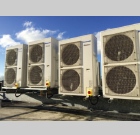Panasonic takes off at GE Aviation

The latest stage of the long-term programme to replace HVAC systems to improve energy efficiency at the aviation headquarters of GE Aviation involved the installation of Panasonic’s recently developed PACi range of indoor and outdoor units. Eight PACi Elite 14 kW units were installed outdoors, with four under-ceiling units and four wall-ducted systems indoors. A further 28 kW of PACi cooling technology has been installed in the factory. R410A is the refrigerant.
GE Aviation provides jet and turbo engines. The work was carried out by Swift Express Maintenance of Bristol, which worked with GE Aviation 20 years previously when the initial heating, cooling, ventilation and air-conditioning equipment had been installed.
When replacement was required, Swift Express was asked to design and specify a solution with good efficiency capabilities, working to high demands and to the specific temperatures required for the heavy-duty work carried out at this aviation headquarters.
Owing to the delicate environment and equipment handled by GE Aviation, a fire watch of four hours is required for hot works, so Swift Express opted to use the Reflok aluminium piping system with the Panasonic equipment.
Josh Muschamp, who is responsible for business development with Swift Express, says, ‘Since the initial install five years ago, Panasonic’s heating and cooling systems haven’t stopped or had any problems. We have worked with Panasonic for many years and have never incurred any technical problems with its kit. That is why we chose to specify their range of PACi air-conditioning units for this prestigious project.’







